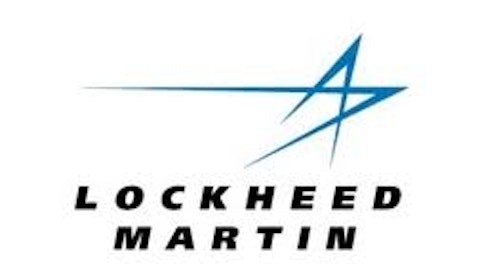
Dividends are paid from net income. In other words, the cash that’s left after taxes, expenses, etc. So, for example, let’s say Lockheed Martin Corporation (NYSE:LMT) takes a hit in its profit because the government isn’t spending as much money. In theory, that could impact its dividend. Well, sequestration will definitely impact defense companies’ profits, so does that mean defense dividends will take a hit? Unlikely, and it’ll probably be minimal if they do. Here’s why:
Lockheed Martin Corporation (NYSE:LMT), The Boeing Company (NYSE:BA) , Northrop Grumman Corporation (NYSE:NOC) , Rockwell Collins, Inc. (NYSE:COL) , and United Technologies Corporation (NYSE:UTX) , all pay dividends, which is great for investors. Even better? Their dividend payout ratio is pretty low, and because of that, sustainable even if affected by sequestration. Take a look: Lockheed Martin Corporation (NYSE:LMT)’s payout ratio is the highest at 50%, and United Technologies’ is second at 38%. The Boeing Company (NYSE:BA) and Rockwell are tied for third with a payout ratio of 34%, and Northrop has the lowest payout ratio, at 28%.
Another factor to keep in mind? While sequestration does mean a reduction in defense spending, it’s only returning defense spending to 2007 levels. In other words, there’s still a heck of a lot of defense spending going on, so these companies aren’t going to see all their revenue vanish overnight. Go down? Yes. Dry up? Nope. What’s more, these companies’ market caps are in the billions. They’re not small companies that can’t take a little turbulence. That’s not to say they won’t be affected; they undoubtedly will be. But they’re resilient.
Another thing to keep in mind is how defense contractors are paid. In defense contracting, it can take years to award a contract, obligate funding, and pay the defense contractor. When the money is finally transferred from the U.S. Treasury to the company, it becomes an outlay, or what’s known as backlog for a company. Sequestration won’t affect money that’s already been obligated, and as a result, the effects of sequestration on defense contractors will be gradual, taking three to four years for them to feel the full impact. And like I’ve said before, these companies have been preparing for this, and as a result, aren’t being caught with their pants around their ankles.
Last, and I can’t say this enough, defense contractors provide a service that only they can. They are essential to the military, and the military is essential to America. Neither is going anywhere anytime soon. Consequently, I wouldn’t be too worried about your defense dividends.
The article Defense, Dividends, and Sequestration: What Investors Need to Know. originally appeared on Fool.com and is written by Katie Spence.
Fool contributor Katie Spence owns shares of Northrop Grumman, and is still hoping people panic so she can get more for cheap. Follow her on Twitter @TMFKSpence. The Motley Fool owns shares of Lockheed Martin and Northrop Grumman.
Copyright © 1995 – 2013 The Motley Fool, LLC. All rights reserved. The Motley Fool has a disclosure policy.





